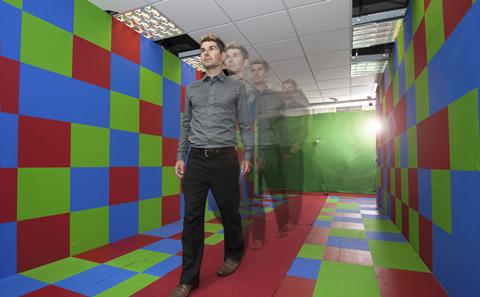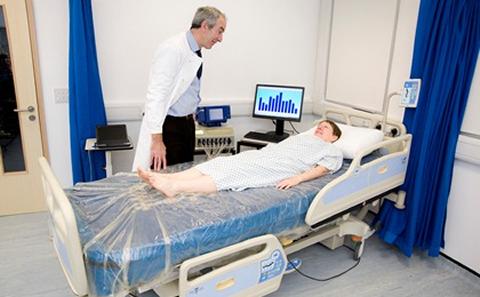
Coda motion capture
In our biomechanics lab at SGH the system analyses human motion within a clinical environment
At the University of Southampton our vision is to develop and evaluate technologies for use in neurological rehabilitation.
Four main suites for cell culture, tissue characterisation, microscopy and fabrication of lab-on-a-chip devices. The development has included major investment in equipment including an atomic force microscope (with a nano-hardness stage), an incubator (with controlled CO2 and humidity), a plate reader (measuring real time development of biofilms), a microtome (for thin sectioning of biological tissue) and a range of optical microscopes, including an image analysis system for flow cell studies. The laboratory provides an excellent platform for expansion of bioengineering research in the areas of performance assessment of orthopaedic implants mechanobiology and tissue engineering, microfluidics and Lab-on-a-Chip applications in bioengineering and bio sensing. In health technologies we are growing world leading expertise on probabilistic computational and experimental mechanics of the musculoskeletal system from the micro scale through to macro and large length scales. We are very fortunate to have complementary groups across the university who are keen to collaborate in all aspects of the group’s research, particularly at the hospital, where we have joint appointments with the bone biology group and with the MuVIS centre, where the state of the art facilities allow us to image musculoskeletal structures in unprecedented detail.
Find out more about the Bioengineering Laboratory
This facility enables analysis of human movement through the measurement of joint angles, muscle activity, and the external and internal forces acting on the body. The laboratory is used to explore the mechanisms of pathology that lead to movement dysfunction and aids in the development and assesses the effectiveness of treatment and rehabilitation. The high specification motion capture system enables a vast array of movement to be analysed from walking, through to the upper limb and the small intricate movements of the hand and fingers.
This offers the single largest high energy, high resolution computer tomography capability in UK universities. The further important thrust of the work is the numbers of samples that we can put through. In addition to the large scanning machine, we have another device sitting beside it that will handle smaller objects. In that machine, we can basically scan at a rate that's about ten times faster than comparable systems around the UK or indeed around the world can typically achieve. Computing hardware and the analysis software that we integrate into a complete workflow allows the overall productivity, end to end, to be faster than it is elsewhere. Relevant health technologies research includes examining how the quality of bone is affected by different treatments (Professors Richard Oreffo and Ian Sinclair)and testing implanted bone to find out the effects of loading (Professors Ian Sinclair and Martin Browne). The integrated suite of scanning devices handle a wide range of health technology interests - from tissues to organs to implants to actual medical devices and contribute to health Technologies projects on lung tissue characterisation with an ultimate view to improved hospital scan diagnosis for asthma; lightweight oxygen cylinders for improved ambulatory oxygen cylinders for improved LTOT compliance in COPD patients; novel implant materials like the tissue scaffolds and regenerative medicine already referred to and microvascular mapping for metabolic syndrome studies.
Find out more about the μ-VIS Lab
This unique environment provides new analytical tools to probe ever deeper into biological systems and fuel the development of innovative solutions to address today's major healthcare challenges. Health Technologies work at Southampton in this area includes among other things Blood Cell Analysis for Point of Care Diagnostics which is a collaboration with industry (Philips) and the Faculty of Medicine. Microchip technology is able to perform a full blood count from a tiny drop of blood taken from a finger prick. This new diagnostic tool will have many uses in monitoring chronic disease. One application is for cancer patients who are on chemotherapy. The chip will measure the neutrophil count every day: too low a count leads to neutropenia, a condition that requires urgent medical intervention. Other projects include: developing new tools for understanding how single cells communicate and how T cells are triggered, with the aim of developing better vaccines; a project with Sharp Labs and PHE where we are developing diagnostic chips for rapid analysis of genes and proteins in bacteria to determine antibiotic resistance, and in a related project making nanowire sensors for low-cost multiplexed analysis of cytokines to detect inflammatory markers. Further examples include wireless and battery-less in vivo sensor technology for continuous recording of physiological parameters.
This lab contains functional electrical stimulation and measurement tools for understanding the mechanism of impairment and recovery, upper limb rehabilitation robots (commercial ARMEO from Hocoma and a bespoke in-house system). It also contains a Transcranial Direct Current Stimulation system that is used for research into recovery of motor control via transcranial stimulation.
Find out more about Biomechanic Laboratories (TDCS and rehabilitation robotics)

In our biomechanics lab at SGH the system analyses human motion within a clinical environment

Multidisciplinary research focusing on continence, pressure ulcers, nutrition and infection control
The University cannot accept responsibility for external websites.